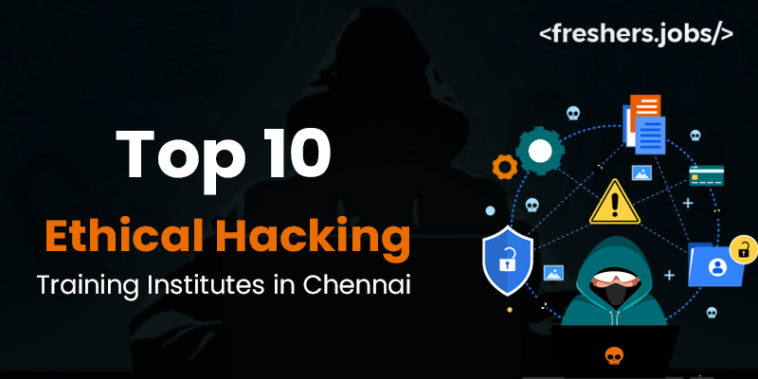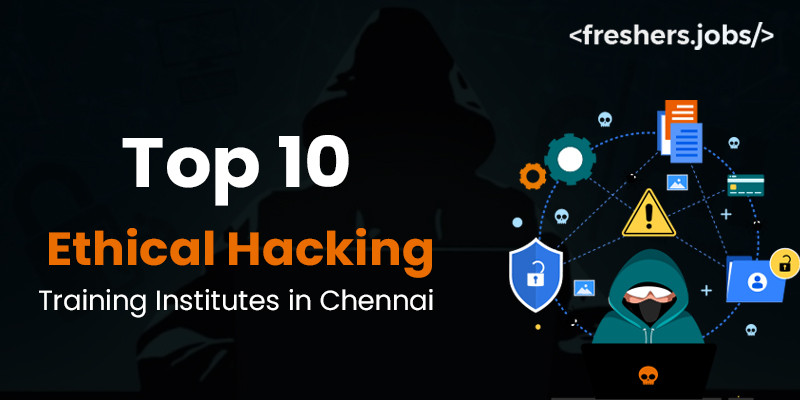The business landscape has experienced a significant transformation due to digital advancements and technological leaps. The connectivity and reliance on digital platforms have brought about numerous opportunities but have also exposed organizations to countless cybersecurity threats. As businesses digitize their operations and data, the demand for cybersecurity professionals, particularly Ethical hackers, has skyrocketed.
The demand for Ethical hacking is driven by the increasing cyber threats, regulatory requirements, financial implications of security breaches, and a growing awareness of the significance of cybersecurity in today’s business landscape. Ethical hackers will likely become even more critical in safeguarding organizations from cyber threats as technology evolves. We will explore the Top 10 Ethical Hacking Training Institutes in Chennai, its role in current business, merits, key aspects, and job opportunities.
Following is the list of the Top 10 Ethical Hacking Training Institutes in Chennai.
- FITA Academy
- Simplilearn
- Intellipaat
- Edureka
- Besant Technologies
- BTree Systems
- Greens Technologys
- Shiksha
- ACTE
- KaaShiv Infotech
1. FITA Academy
FITA Academy, an esteemed training institute, offers a comprehensive array of 120+ courses accessible online and offline. Renowned for providing crucial technical and professional certifications, the academy consistently maintains a significant presence in the industry. With a team exceeding 1,000 trainers, each with decades of experience, the institute has positively influenced the learning paths of more than 75,000 individuals. The academy underscores its dedication to delivering excellent training by establishing branches in Bangalore, Pondicherry, Coimbatore, and Madurai. This strategic expansion ensures that individuals in diverse regions can avail themselves of high-quality training opportunities.
Why choose the Ethical Hacking Course in Chennai at FITA Academy?
FITA Academy in Chennai offers a comprehensive Ethical Hacking Course that covers concepts from fundamental to advanced levels. The curriculum delves into various security processes, including network scanning, cryptography, vulnerability detection, penetration testing, and real-time projects, with practical examples. This course empowers eager individuals with essential cybersecurity skills, transforming them into proficient hackers. Through practical, hands-on training, Students gain expertise in hacking tools like Burp Suite, N-map, and Nessus. The curriculum, designed by experienced trainers, ensures optimal learning outcomes, providing students access to the latest resources and practical training for a well-rounded educational experience. The academy ensures flexibility by offering batch schedules on both weekends and weekdays. Additionally, successful participants are eligible for placement support upon completing the training.
Customized Curriculum of Hacking Class in Chennai
The curriculum for Ethical Hacking Course in Chennai comprehensively covers fundamental concepts, including Ethical Hacking, FootPrinting (Reconnaissance-Passive), Enumeration (Reconnaissance – Active), Network Scanning, System Hacking Methodology, Virtual Machine, Kali Linux, and Metasploit. Students gain insights into various tools such as N-map, Burp-Suite, Sniffing, Malware Threats, Virus & Worms, Denial of Services (DoS) & Distributed Denial of Services (DDoS), Session Hijacking Techniques, Server Attacks (Web Server, File Servers), Hacking Web Applications, SQL Injection Attacks, Wireless Networks Attacks, IDS, IPS, Firewalls, and Honeypots, Cloud Computing Techniques, Cryptography, and Social Engineering. The curriculum explores topics like Ethical Hacking Experts, Building and Setting Up the Laboratory, Google HDB, OSINT (Open Source Intelligent), Social Engineering Techniques, Scanning and Enumeration Using Advanced Tools, Other Tools, Exploitation, Metasploit Framework for Penetration Testing, Password Cracking, Post Exploitation, OWASP Top 10 Vulnerability, Information Security Audit, and Audit Reporting.
Expert Instructors for the Hacking Course in Chennai
Proficient trainers with extensive hands-on experience in the industry facilitate FITA Academy‘s Ethical Hacking Training in Chennai. These instructors are dedicated to delivering theoretical knowledge alongside valuable real-world insights, ensuring students are well-versed in the latest industry trends for thorough preparation in this ever-evolving field.
Project Presentation Sessions
A crucial aspect of FITA Academy’s Hacking Class in Chennai includes project presentation sessions. Acknowledging the significance of practical experience in mastering Ethical Hacking and gearing up for a prosperous career, these sessions enable students to apply their acquired knowledge and principles in real-world scenarios, offering invaluable hands-on exposure.
Complimentary Placement Sessions
FITA Academy is committed to providing a comprehensive Ethical Hacking Course in Chennai that goes beyond traditional classroom education. The institute prepares students for the competitive job market through complimentary placement sessions, covering vital aspects such as resume building, honing interview skills, job placement assistance, and career guidance. These thoughtfully curated sessions aim to support students in realizing their career objectives. With a vast network of more than 1,500 partner companies, FITA Academy facilitates job placements for graduates, offering a range of opportunities within the industry. This comprehensive network ensures that students have access to promising career prospects, enabling a seamless and successful transition into the professional realm.
2. Simplilearn
Simplilearn stands out as a well-regarded online platform that offers a flexible Ethical Hacking Course covering fundamental to advanced concepts. While the institute provides a comprehensive range of courses, the primary focus on online learning may limit direct interaction between learners and trainers, potentially resulting in higher costs.
3. Intellipaat
Intellipaat specializes in delivering Ethical Hacking Classes suitable for both beginners and advanced learners. They feature a curriculum enriched with valuable learning materials. However, the strong emphasis on online classes may impact the extent of direct interaction between instructors and students, and the course cost could be relatively higher compared to alternative institutes.
4. Edureka
Edureka focuses on providing Ethical Hacking Courses to enhance skills and impart valuable industry knowledge. The predominant emphasis on online courses may reduce direct interaction between learners and trainers, making it potentially less favorable for those seeking a more in-depth learning experience.
5. Besant Technologies
Besant Technologies offers comprehensive Ethical Hacking Classes with real-time assistance. Despite all these facilities, it may not be the preferred choice for individuals seeking a more profound learning experience.
6. BTree Systems
BTree Systems specializes in tailored Ethical Hacking Courses designed to meet industry-specific requirements. However, it may not provide as comprehensive placement support compared to certain other institutes.
7. Greens Technologys
Greens Technologys provides an extensive Ethical Hacking Course to equip learners with essential skills. But, it may not be the ideal choice for those seeking a more extensive and in-depth learning experience compared to other institutes.
8. Shiksha
Shiksha is known for providing specialized Ethical Hacking Classes tailored to industry-specific needs. However, it may not offer as comprehensive practical training as some other institutes.
9. ACTE
ACTE specializes in delivering comprehensive Ethical Hacking Classes covering a range of concepts. While offering these benefits, the level of placement support provided might be relatively less extensive compared to certain other institutes.
10. KaaShiv Infotech
KaaShiv Infotech offers Ethical Hacking courses with a focus on imparting essential skills. It’s worth noting that the practical training component may not be as extensive as some other institutes.
Freshers Jobs meticulously selected these institutes after thorough research, considering factors such as brand reputation, student feedback, and a proven track record of student achievements.
Role of Ethical Hacking in Modern Business
The role of ethical hacking in today’s business era has become increasingly indispensable. Ethical hacking, known as penetration testing, is pivotal in identifying and addressing company information system vulnerabilities. By simulating cyber attacks, ethical hackers proactively uncover weaknesses that malicious actors could exploit, allowing organizations to fortify their defenses before potential threats materialize. One of the key functions of ethical hacking is securing sensitive data. As businesses store vast amounts of critical information online, ethical hacking helps identify and mitigate vulnerabilities in networks, databases, and applications, protecting customer data, financial records, and intellectual property.
Moreover, ethical hacking is closely tied to compliance and regulatory requirements. Many industries, such as finance, healthcare, and government, are subject to stringent cybersecurity regulations. Ethical hacking assists businesses in ensuring compliance by regularly assessing and enhancing security measures, mitigating the risk of legal consequences associated with data breaches. Ethical hacking is a proactive defense mechanism in the face of the escalating frequency and sophistication of cyber attacks. By identifying and addressing security risks, ethical hackers contribute to the prevention of data breaches, financial losses, and reputational damage, safeguarding businesses against the evolving threat landscape.
Ethical hacking also plays a pivotal role in promoting cybersecurity awareness within organizations. Through security assessments and simulations, ethical hackers educate employees and management about potential risks, fostering a culture of vigilance and emphasizing the importance of maintaining a secure digital environment. Additionally, ethical hacking is integral to an organization’s risk management strategy. By regularly assessing the security posture, businesses can make informed decisions regarding their cybersecurity investments, prioritizing efforts to address the most critical vulnerabilities and bolstering overall resilience. Beyond prevention, ethical hacking contributes to incident response planning. By simulating cyber attacks, organizations can evaluate the effectiveness of their response mechanisms, identify areas for improvement, and ensure a swift and coordinated reaction in the event of a real security incident.
Furthermore, ethical hacking plays a role in building trust with customers. In an era where data breaches can erode customer confidence, businesses that invest in securing their systems and data through ethical hacking are more likely to build and maintain solid relationships with their clients. In conclusion, ethical hacking is a proactive and essential component of modern business cybersecurity strategies. Its multifaceted role encompasses securing sensitive data, ensuring regulatory compliance, preventing cyber-attacks, promoting cybersecurity awareness, supporting risk management, and building customer trust in an interconnected digital business environment.
What is Ethical Hacking?
Ethical hacking, penetration testing or white-hat hacking, is a legal and authorized practice of probing computer systems, networks, and applications to identify security vulnerabilities. The aim of ethical hacking is to assess a system’s security with the owner’s or stakeholders’ permission. Ethical hackers, often employed by organizations or hired as independent consultants, use their skills to mimic the tactics of malicious hackers. However, unlike malicious hackers, ethical hackers work to discover and address vulnerabilities rather than exploit them for malicious purposes. Ethical hacking is a crucial component of an organization’s cybersecurity strategy. It helps proactively identify and address security weaknesses, mitigating the risk of data breaches, financial losses, and reputational damage. Certified ethical hackers often hold industry-recognized certifications such as Certified Ethical Hacker (CEH) to demonstrate their expertise and adherence to ethical hacking principles.
Merits of Ethical Hacking
- Identification of Vulnerabilities: Ethical hacking helps organizations identify & address vulnerabilities in their networks, systems, and applications. By proactively searching for weaknesses, organizations can strengthen their security measures before malicious hackers exploit them.
- Enhanced Security Posture: Organizations can maintain an enhanced security posture through regular ethical hacking assessments. Addressing vulnerabilities promptly and efficiently minimizes the risk of security breaches, protecting sensitive data and maintaining the integrity of systems.
- Risk Mitigation: Ethical hacking enables organizations to assess and mitigate risks associated with potential cyber threats. By understanding and addressing vulnerabilities, organizations can reduce the likelihood of financial losses, operational disruptions, and reputational damage resulting from security incidents.
- Compliance with Regulations: Many industries & sectors are subject to strict cybersecurity regulations. Ethical hacking helps organizations ensure compliance with these regulations by identifying and addressing security gaps that may violate legal requirements.
- Prevention of Data Breaches: Ethical hacking is crucial in preventing data breaches by identifying and fixing vulnerabilities before malicious actors can exploit them. This proactive approach safeguards sensitive information and protects the privacy of individuals associated with the organization.
- Cybersecurity Awareness: Ethical hacking promotes cybersecurity awareness within organizations. Organizations can educate employees and management about potential risks by conducting simulated cyber-attacks, fostering a culture of vigilance and responsibility regarding cybersecurity.
- Incident Response Preparedness: Ethical hacking assessments contribute to incident response preparedness. By simulating cyber attacks, organizations can evaluate the effectiveness of their response mechanisms, identify areas for improvement, and ensure a prompt and coordinated reaction in the event of a real security incident.
- Building Trust with Stakeholders: Demonstrating a commitment to cybersecurity through ethical hacking practices helps build trust with customers, partners, and stakeholders. Organizations that invest in securing their systems and data will likely maintain a positive reputation and strengthen relationships with their clientele.
- Competitive Advantage: Organizations prioritizing ethical hacking as part of their cybersecurity strategy gain a competitive advantage. Demonstrating a proactive approach to security can enhance an organization’s credibility and attractiveness to clients and partners who prioritize data protection.
- Professional Development: Ethical hacking provides opportunities for individuals to develop and enhance their cyber security skills. Certified ethical hackers often undergo specialized training and certifications, contributing to their professional growth and making them valuable assets in the cybersecurity landscape.
Key Aspects of Ethical Hacking
Authorization
- Permission and Consent: Ethical hacking requires explicit permission and consent from the organization or individual responsible for the targeted system. This ensures that the ethical hacker operates within legal and ethical boundaries.
Planning and Scope Definition
- Scope of Engagement: Clearly defining the scope of the ethical hacking engagement is essential. This includes specifying the systems, networks, or applications the ethical hacker can test. A well-defined scope helps prevent unintended disruptions and ensures a focused assessment.
Reconnaissance
- Information Gathering: Ethical hackers conduct surveys to gather information about the target system. This may involve collecting data on the organization’s infrastructure, networks, and publicly available information that could be leveraged for potential vulnerabilities.
Vulnerability Analysis
- System Assessment: Ethical hackers analyze the target system for vulnerabilities. This includes evaluating software configurations, network architecture, and potential application weaknesses. Automated tools and manual analysis are often employed during this phase.
Exploitation
- Simulated Attacks: Ethical hackers attempt to exploit identified vulnerabilities in a controlled and responsible manner. The goal is not to cause harm but to demonstrate the potential impact of these vulnerabilities. This phase helps organizations understand how malicious actors could exploit vulnerabilities.
Post-Exploitation Analysis
- Assessment of Impact: After attempting exploitation, ethical hackers analyze the impact of successful attacks. This includes assessing the potential consequences, data access, and control that a malicious actor could gain if the vulnerabilities were exploited in a real-world scenario.
Documentation and Reporting
- Comprehensive Reports: Ethical hackers provide detailed reports to the organization, documenting the vulnerabilities discovered, their potential impact, and recommendations for remediation. Clear and comprehensive reporting is crucial for effectively addressing identified weaknesses.
Remediation and Recommendations
- Actionable Recommendations: Ethical hackers work with the organization to implement remediation measures. They provide actionable recommendations to fix or mitigate identified vulnerabilities, enhancing the overall security posture of the system.
Continuous Monitoring
- Ongoing Assessment: Ethical hacking is not a one-time activity. Continuous monitoring and periodic assessments are essential to account for changes in the system, new vulnerabilities, and evolving cyber threats. Regular assessments help organizations stay resilient against emerging risks.
Ethics and Professionalism
- Adherence to Ethical Standards: Ethical hackers adhere to a strict code of ethics. They prioritize their activities’ lawful and responsible conduct, ensuring that their actions align with legal requirements and industry standards.
Job Opportunities in Ethical Hacking
- Security Analyst / Junior Ethical Hacker: Entry-level professionals often start as security analysts or junior ethical hackers. They assist in vulnerability assessments, conduct security testing, and support more experienced team members.
- Security Consultant (Trainee): Trainee security consultants work under the guidance of senior consultants, gaining hands-on experience in ethical hacking tasks such as penetration testing, vulnerability analysis, and report generation.
- Ethical Hacker / Security Consultant: Professionals at this level conduct in-depth security assessments, penetration testing, and vulnerability analyses. They may specialize in specific areas like web application or network security.
- Security Engineer: Security engineers design and implement security measures for systems and networks. Their responsibilities may include tasks such as working on security architecture, configuring firewalls, and formulating strategies to safeguard against cyber threats.
- Incident Responder: Professionals in incident response roles focus on investigating and responding to security incidents. They play a crucial role in identifying the root causes of breaches and implementing measures to prevent future incidents.
- Security Researcher: Security researchers explore new vulnerabilities, analyze emerging threats, and contribute to developing security tools and solutions. They often work for security companies, research institutes, or academia.
- Senior Ethical Hacker / Lead Security Consultant: Senior ethical hackers lead and manage security assessments, mentor junior team members, and provide strategic guidance to improve overall cybersecurity posture.
- Security Architect: Security architects design and implement comprehensive security solutions for organizations. They develop security policies, design networks, and ensure systems meet industry standards.
- Chief Information Security Officer (CISO): CISOs are senior executives responsible for the overall security strategy of an organization. They oversee the implementation of security policies compliance with regulations and lead incident response efforts.
- Security Director: Security directors manage the security function within an organization. They develop security programs, oversee security teams, and collaborate with other departments to ensure a holistic approach to cybersecurity.
- Penetration Tester: Professionals in penetration testing roles focus on simulating cyber attacks to identify vulnerabilities. They conduct thorough assessments and provide detailed reports on potential weaknesses.
- Security Auditor: Security auditors assess the effectiveness of security measures and policies within an organization. They may conduct internal or external audits to ensure industry standards and regulations compliance.
- Security Trainer / Instructor: Individuals with extensive experience in ethical hacking may choose to become trainers or instructors, sharing their knowledge through workshops, courses, or training programs.
The extensive connectivity and dependence on digital platforms have presented abundant opportunities and various cybersecurity threats for organizations. With the increasing digitization of operations and data, there has been an exponential surge in the demand for cybersecurity professionals, especially Ethical hackers. This demand is based on factors such as the rising frequency of cyber threats, stringent regulatory requirements, financial repercussions of security breaches, and a heightened awareness of cybersecurity’s crucial role in the modern business environment. This blog will explore the Top 10 Ethical Hacking Training Institutes in Chennai, their role in the current business landscape, merits, key aspects, and the job opportunities available within the industry.





